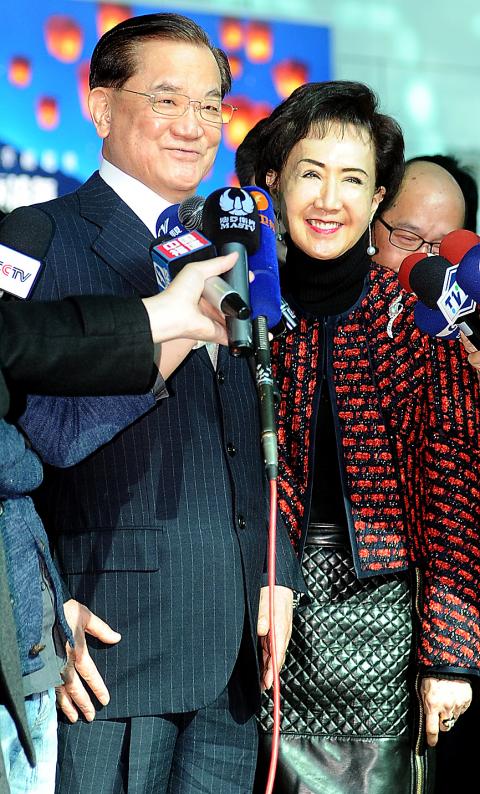Mainland Affairs Council (MAC) Minister Wang Yu-chi (王郁琦) yesterday said that any further breakthroughs between the two sides of the Taiwan Strait will have to be achieved “slowly, one step at a time.”
Previously, China referred to the council by all kinds of alternative names, but it used the title “Mainland Affairs Council” for the first time during Wang’s visit last week, he said in a radio interview.
“This is progress, a breakthrough,” he said.

Photo: CNA
Wang said that other breakthroughs achieved during his four-day visit included his public reference to the Republic of China (ROC) and the use of his official title on a card attached to a wreath presented at ROC founding father Sun Yat-sen’s (孫逸仙) mausoleum in Nanjing.
Wang said that the proposal to hold a presidential summit between the two sides during the Beijing-sponsored Boao Forum for Asia will have to be studied.
He gave that assessment after the Chinese government ruled out the possibility of such a summit taking place at the APEC forum in Beijing in November.
China does not deem it appropriate for the leaders from each side of the Taiwan Strait to meet in an international setting such as the APEC forum, so the possibility of them meeting at that time is not high, Wang said.
Wang added that he would ask former vice president and former Chinese Nationalist Party (KMT) chairman Lien Chan (連戰) to raise the issue of officials’ right to visit detainees on the opposite side during his visit to China.
Lien left for Beijing yesterday.
The two sides have in principle reached an agreement to set up reciprocal representative offices, but there are still differences over Taiwan’s request that officials of its proposed representative office in China be allowed to visit Taiwanese detainees there, and vice versa.
Lien, who chairs the Lien Chan Foundation for Peace and Development, is leading a delegation of business and KMT officials on a four-day visit, during which they will attend a forum and exchange ideas with their counterparts in China.
Taiwan Affairs Office spokeswoman Fan Liqing (范麗青) yesterday said in Beijing that Lien will meet with Chinese President Xi Jinping (習近平), who is also general secretary of the Chinese Communist Party.
It will be Lien’s second meeting with Xi in as many years.
Lien’s visit will be meaningful for the expansion and deepening of exchanges between the two sides of the Taiwan Strait and will be beneficial to enhancing mutual understanding between the two sides, Fan said, lauding Lien for making significant contributions to promoting the peaceful development of cross-strait relations.
In 2005, Lien became the first top KMT leader to visit China since 1949. Since then, he has maintained warm relations with top CCP leaders, including Xi’s predecessor former Chinese president Hu Jintao (胡錦濤), Fan said.

MAKING WAVES: China’s maritime militia could become a nontraditional threat in war, clogging up shipping lanes to prevent US or Japanese intervention, a report said About 1,900 Chinese ships flying flags of convenience and fishing vessels that participated in China’s military exercises around Taiwan last month and in January last year have been listed for monitoring, Coast Guard Administration (CGA) Deputy Director-General Hsieh Ching-chin (謝慶欽) said yesterday. Following amendments to the Commercial Port Act (商港法) and the Law of Ships (船舶法) last month, the CGA can designate possible berthing areas or deny ports of call for vessels suspected of loitering around areas where undersea cables can be accessed, Oceans Affairs Council Minister Kuan Bi-ling (管碧玲) said. The list of suspected ships, originally 300, had risen to about

DAREDEVIL: Honnold said it had always been a dream of his to climb Taipei 101, while a Netflix producer said the skyscraper was ‘a real icon of this country’ US climber Alex Honnold yesterday took on Taiwan’s tallest building, becoming the first person to scale Taipei 101 without a rope, harness or safety net. Hundreds of spectators gathered at the base of the 101-story skyscraper to watch Honnold, 40, embark on his daredevil feat, which was also broadcast live on Netflix. Dressed in a red T-shirt and yellow custom-made climbing shoes, Honnold swiftly moved up the southeast face of the glass and steel building. At one point, he stepped onto a platform midway up to wave down at fans and onlookers who were taking photos. People watching from inside

Japan’s strategic alliance with the US would collapse if Tokyo were to turn away from a conflict in Taiwan, Japanese Prime Minister Sanae Takaichi said yesterday, but distanced herself from previous comments that suggested a possible military response in such an event. Takaichi expressed her latest views on a nationally broadcast TV program late on Monday, where an opposition party leader criticized her for igniting tensions with China with the earlier remarks. Ties between Japan and China have sunk to the worst level in years after Takaichi said in November that a hypothetical Chinese attack on Taiwan could bring about a Japanese

The WHO ignored early COVID-19 warnings from Taiwan, US Deputy Secretary of Health and Human Services Jim O’Neill said on Friday, as part of justification for Washington withdrawing from the global health body. US Secretary of State Marco Rubio on Thursday said that the US was pulling out of the UN agency, as it failed to fulfill its responsibilities during the COVID-19 pandemic. The WHO “ignored early COVID warnings from Taiwan in 2019 by pretending Taiwan did not exist, O’Neill wrote on X on Friday, Taiwan time. “It ignored rigorous science and promoted lockdowns.” The US will “continue international coordination on infectious